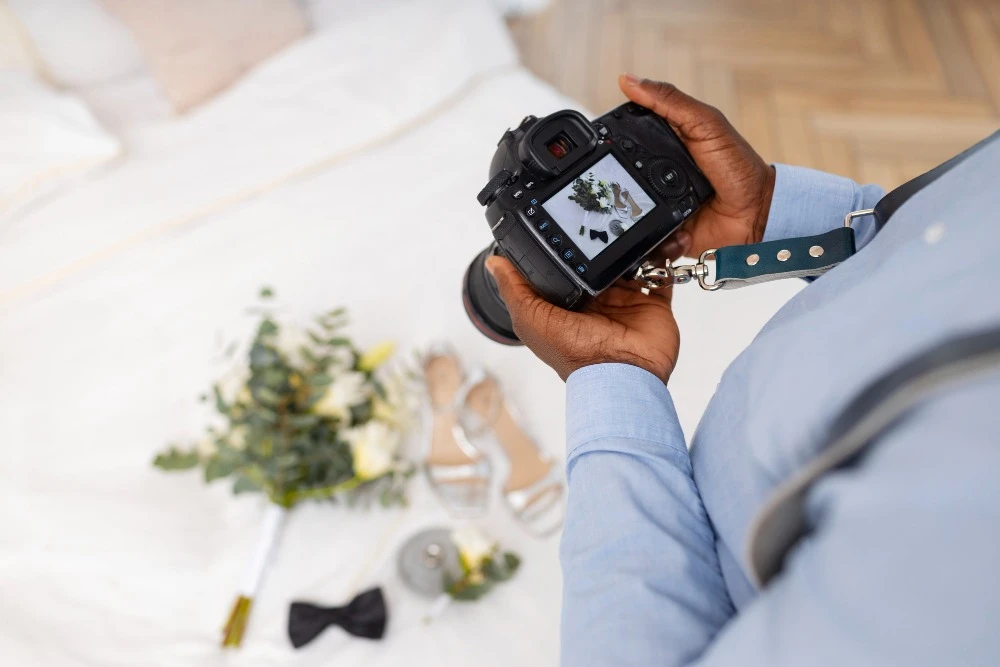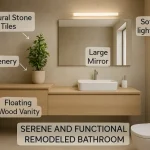Organizing a wedding represents much more than just a party: it’s about orchestrating a memorable experience where every detail matters. Behind every successful celebration lies a team of talented professionals who transform your vision into reality. This guide will help you identify the essential vendors and understand their role in creating your perfect day.
The Photographer: Capturing the Emotion of Your Story
A wedding passes in a beautiful blur, but photographs remain forever. The photographer is therefore one of the first vendors to select, well before finalizing all other details.
The best photographers book up months, even over a year in advance. Their calendars fill quickly, especially during peak wedding season (May to September). By booking early, you ensure having THE photographer whose style perfectly matches your vision.
Styles vary considerably: documentary reportage for natural and spontaneous images, fine art for an artistic and timeless approach, or a contemporary blend combining multiple approaches.
Take time to review several complete portfolios to assess consistency and quality throughout an entire day. Expect between $1,800 and $6,000 depending on the photographer’s experience, coverage duration, and included deliverables.
The Videographer: Immortalizing Moments in Motion
If photography freezes the moment, video captures the atmosphere, voices, laughter, and overall ambiance of your celebration. A video allows you to relive moments you missed on the day itself: your guests’ reactions during the ceremony, emotional speeches, spontaneous dances.
If you’re looking for a professional wedding videographer and photographer who can capture both the still moments and moving emotions of your day, consider professionals who offer comprehensive packages combining both services.
Professional wedding videographers create true cinematic films that tell your story with a narrative and artistic approach. Some favor a narrative approach with pre-interviews and scripted construction, while others adopt a purely documentary style.
Professional wedding films generally start at $2,400 and can reach $7,200 or more for high-end productions including multiple days of shooting, drones, and elaborate editing.
The Venue: The Setting for Your Celebration
Your venue choice influences practically every other aspect of your wedding, from decoration to catering to guest count.
Options range from historic castles and estates for a majestic atmosphere, to renovated barns and industrial spaces for a modern style, gardens and vineyards for outdoor celebrations, or restaurants and hotels for turnkey solutions.
Before booking, clarify maximum capacity, access hours for setup and breakdown, any restrictions (end time, sound level), and what’s included in the rental fee. Venue rental often represents the largest expense, ranging from $1,200 for a simple space to $12,000 or more for a prestigious estate.
The Caterer: Delighting Your Guests with Elegance
Food quality deeply marks your guests’ experience. A full-service caterer provides much more than food: welcome cocktail, seated meal or buffet, bar service, cake service, and even coordination with other vendors.
The best caterers organize tastings where you sample different menus and adjust according to your preferences, dietary restrictions, and particular desires. Expect between $70 and $240 per person depending on service type and menu complexity, plus an additional 20 to 30% for beverages.
The Wedding Planner: Your Orchestra Conductor
A professional organizer can transform your experience from preparation to the big day. Wedding planners offer different packages: day-of coordination only, partial planning for specific aspects, or complete A-to-Z organization.
A good wedding planner has a network of reliable vendors, negotiates on your behalf, manages the timeline and budget, and solves unexpected issues. On the day, they coordinate all vendors and ensure everything goes as planned.
Rates vary from $1,200 for day-of coordination to 10% of the total wedding budget for complete organization.
The Florist: Creating Atmosphere Through Flowers
Flowers transform an ordinary space into a dream venue. A wedding florist designs your bouquet, ceremony decorations, reception centerpieces, and boutonnieres for family and wedding party.
Seasonal flowers cost less and are fresher. Your florist will know how to suggest the best options according to your date and budget, typically ranging from $950 to $3,600 depending on scope and complexity.
The DJ or Live Band: Animating Your Evening
Music sets the rhythm for your wedding. DJs offer unlimited musical variety and easily adapt to changing atmospheres. Live bands bring unique energy and visual entertainment, but with a more limited repertoire and higher cost.
Some couples choose a compromise: live band during cocktail hour and dinner, then DJ for the dance party. Meet your musical vendor before booking to ensure they understand your vision and can read your crowd.
A professional DJ costs between $950 and $2,400, while a live band starts at $1,800 and can reach $6,000 or more.
Invitations and Stationery: The First Impression
Your invitations set the tone for your wedding. A graphic designer creates a cohesive visual identity: save-the-dates, invitations, menus, seating charts, and ceremony programs.
Explore creative options beyond traditional paper: letterpress, hand calligraphy, original formats, or eco-friendly digital invitations. Expect between $3.50 and $18 per invitation depending on design complexity and printing method.
The Wedding Dress and Suit: Looking Your Best
Wedding dresses require 6 to 9 months production time, then several alteration sessions. For custom suits, count 2 to 3 months. Factor these timelines into your planning.
Wedding dresses range from $1,200 to $12,000 or more. Suits range from $360 for ready-to-wear to $2,400 and more for high-end custom tailoring.
Coordinating All Your Vendors
Having good vendors isn’t enough, they must work together harmoniously. Create a shared document with all contact information and the detailed day-of timeline.
Read all contracts carefully before signing. Check cancellation clauses, late penalties, and what happens if a vendor cannot honor their commitment. Consider wedding insurance covering cancellation, vendor issues, and weather for outdoor weddings.
Planning Your Budget and Priorities
Each couple has different priorities. On average, couples spend approximately 35% on venue and catering, 15% on photo and video, 10% on flowers and decoration, 10% on music, 15% on attire, and the rest on stationery and contingencies.
But these percentages are only indicative. Concentrate 80% of your budget on what truly matters to you and will significantly impact your guests’ experience. The remaining 20% can be managed with more flexibility.
Building Your Dream Team
Wedding success comes down to assembling a team of talented professionals who share your vision. Don’t choose your vendors solely on price. Personal chemistry, professionalism, reliability, and work quality take priority.
Start your research early, organize meetings, ask questions, and trust your instinct. The best vendors don’t just execute a service, they actively contribute to creating a memorable experience and accompany you with care on this extraordinary adventure.
Did this guide help you? Browse the rest of this section for more advice on a variety of topics.







